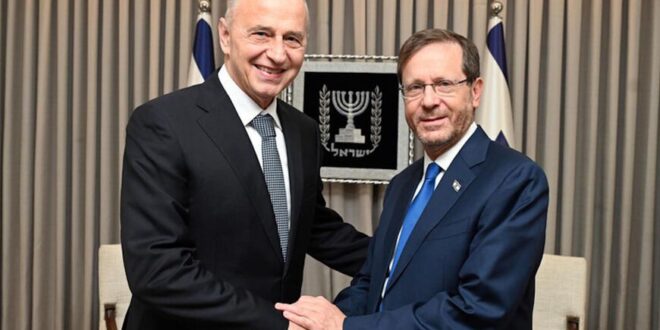NATO Deputy Secretary General Mircea Geoana told Al-Monitor that he is optimistic the alliance will soon conclude a new four-year partnership framework with Israel.
On a three-day visit to Israel, NATO Deputy Secretary General Mircea Geoana said on Friday the defense alliance shares many of the same security concerns as Israel. Speaking with Al-Monitor, Geoana warned against Iran’s affiliation with Russia and the cooperation of the two governments with North Korea.
“We fully understand the deep Israeli concerns over the destabilizing efforts by Iran to create trouble,” Geoana said. “We share many of the concerns that Israel shares. Not only on Iran directly, but also Iran in its constellations of authoritarian regimes, such as the close relationships between Iran and Russia or with North Korea,” he added.
The NATO official highlighted Iran’s role in Ukraine as major challenge to our security both in Europe and also in the Middle East. “In Ukraine, for instance, we are talking of 1,000 [Iran-manufactured] drones. So much destruction, and such a breach of international law,” he said.
US and Western officials have accused Iran of supplying the Kremlin with dozens drones, among them reportedly Shahed-136s and 131s to use them in Ukraine.
Geoana arrived in Israel on Wednesday, following a January visit by Israeli President Isaac Herzog to NATO headquarters in Brussels and against the backdrop of negotiations for a new partnership agreement between the alliance and Israel.
While in Israel, Geoana met with President Isaac Herzog and Prime Minister Benjamin Netanyahu as well as representatives from Israel’s security and high-tech sectors. He also visited Technion — Israel Institute of Technology, in Haifa.
NATO ‘optimistic’ about Israel’s partnership
An Israeli diplomat explained to Al-Monitor that a four-year partnership framework agreement would allow the two sides to advance new projects without needing of turn to political decision makers for approval in each instance. The new framework would also reset the priorities of the partnership, putting an even greater emphasis on cooperation on emerging threats, innovation, resilience, climate change and more. Israel, he said, is seen by NATO as a security provider, not a security consumer. As such, the alliance is interested in Israeli know-how, especially in the areas of drones technologies and intelligence, reverse engineering of weapons, and resilience strategies, including in public health.
Geoana told Al-Monitor that he is optimistic about the talks on a partnership being concluded soon. He added, “We have submitted to Israel our new proposal for a four-year partnership. We are very ambitious from our side, though of course we had a solid foundation to begin with. We have been partners with Israel for almost 20 years now. I would say that one of the backbones of our proposal is new technologies and innovation of ecosystems. We are now waiting for a counter Israeli proposal, which we should get in the coming few weeks. We are hoping to launch our renewed and reinforced partnership in the very near future.”
When Israel first engaged with NATO in the late 1990s, after it signed the Oslo Accords with the Palestine Liberation Organization, their relationship was mostly within the framework of the Mediterranean Dialogue, a forum for cooperation between NATO and seven countries around the Mediterranean. Over the years, Israel has become more interesting to the alliance as a “like-minded country” with whom it can cooperate on technological innovations.
“It is true,” said Geoana, “that much of NATO’s attention is now focused on the war in Ukraine, towards the east, but the southern region [the Mediterranean] is still very important for us. Battling terrorism is also a priority for us. We put big emphasis on our partnerships, in the Gulf, the Istanbul Cooperation Initiative, the Mediterranean Dialogue, these are all very important for us.”
In March, the ELNET European networking group in cooperation with Mitvim Institute, an Israeli thinktank, hosted the first NATO Seminar in the context of the Abraham Accords, focusing on the challenging security environment, and the opportunities arising from the accords, particularly in regard to maritime security, alternative energy sources, and the threat of the deepening Russian-Iranian alliance.
Geoana told Al-Monitor that the alliance supports the Abraham Accords and searches for where it can contribute the most to advance stability in the region.
“The visit of President Isaac Herzog at the Brussels NATO headquarters was very significant,” he remarked. ”It was the first time an Israeli president addressed the North Atlantic Council. At the meeting, Herzog made a very strong case for supporting the Abraham Accords.
“NATO is of course an organization, not a country, thus cannot be part or signatory to the accords, but we encourage all initiatives that enhance stability, especially in the very volatile Middle East region. Don’t forget that other Abraham Accords countries are also partners with NATO. We are very attentive and very supportive of the efforts to enlarge the circle of the accords.”
 Eurasia Press & News
Eurasia Press & News




